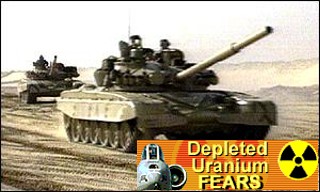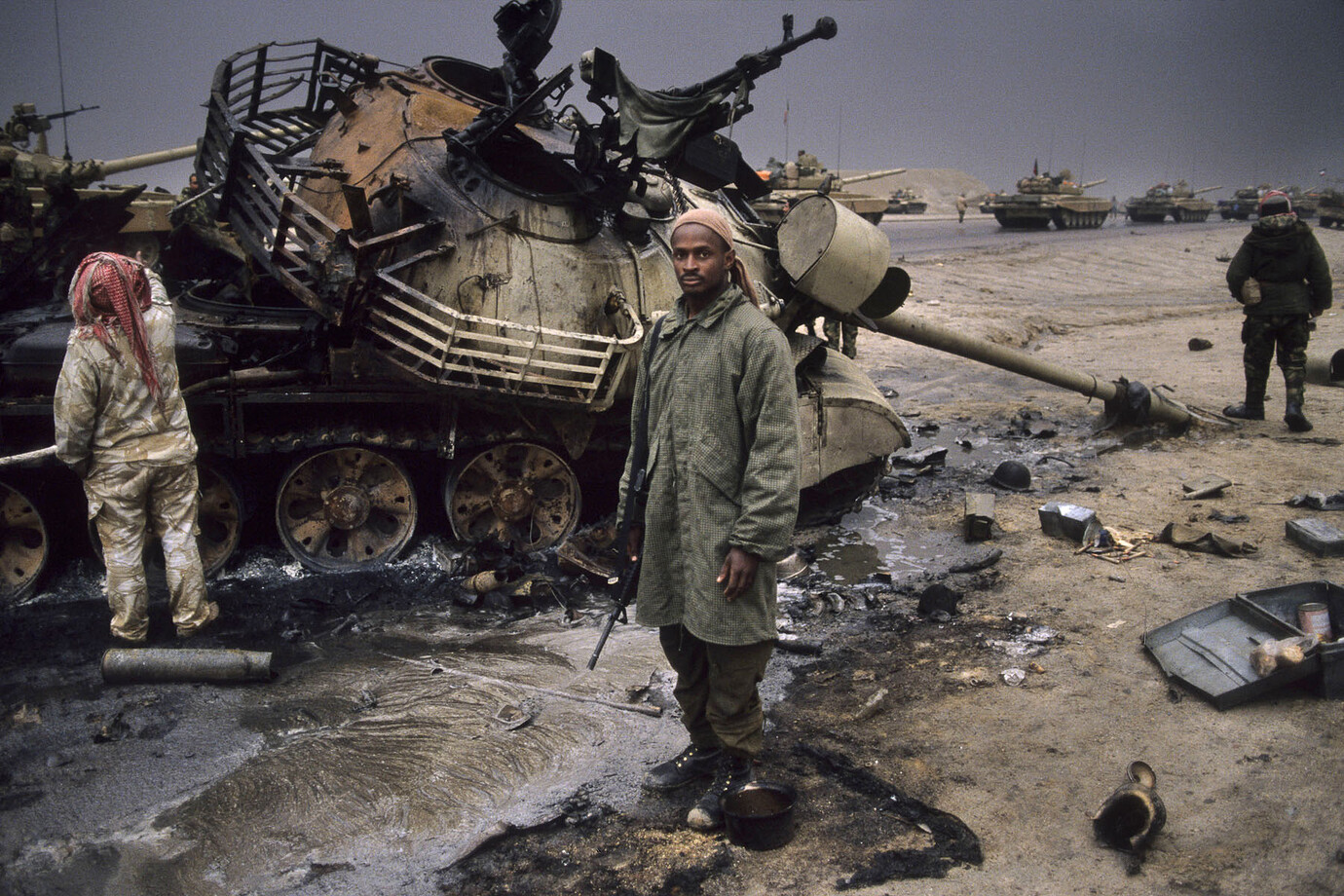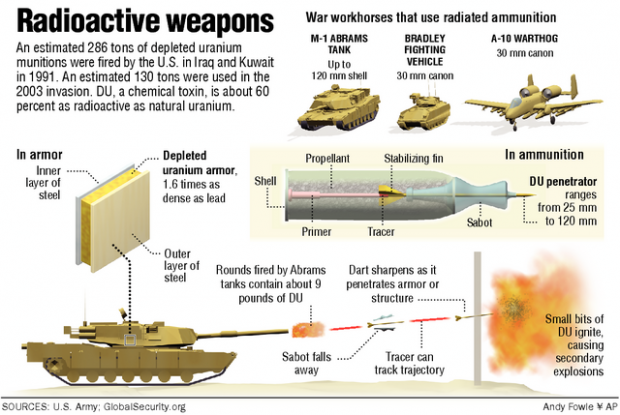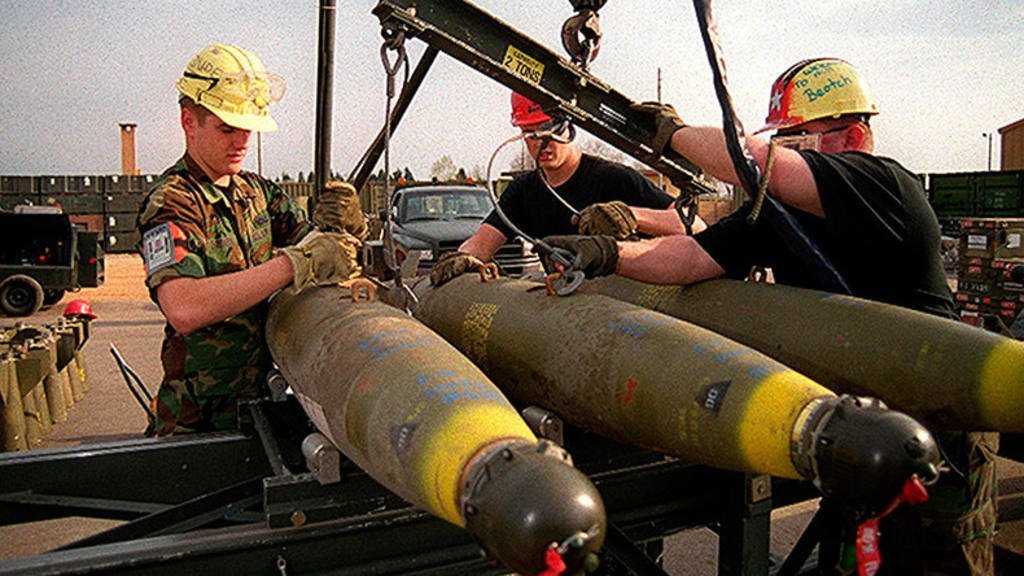
On the Use of Depleted
Uranium Weapons in Ukraine
International Coalition to Ban Uranium Weapons Newsletter
BERLIN (February 14, 2023) — Members and Friends of UCBUW: Dear Colleagues:
This is a special issue of our newsletter in which we want to provide an update on our work.
ICBUW has been closely monitoring the reports about the use or deployment of military equipment with depleted uranium components or ammunition (see for instance our articles here and here). During our continued research work we could certainly observe a (further) decline of rational discourse (a fairly recent example: untrue allegations that MILAN and Javeline use DU components) in relation to the depleted uranium issue.
In this overview, a kind of factual update, we aim to provide information on weapon systems/military equipment which is either already in use in Ukraine or the delivery of which is either discussed or confirmed.
Please note: This overview is focused on military vehicles, which are either already in use or for which delivery is planned and their potential ammunition. Tanks usually rely on multiple ammunition types. The fact that certain ammunition is listed here is also not a confirmation of use or delivery, unless explicitly stated otherwise
|

This overview would also be incomplete without (again) addressing the concerns about Javelin Missile Systems containing depleted uranium, which still surface from time to time in various articles and reports.
Javelin neither has nor requires depleted uranium components in order to be effective, as it employs a so-called “top-attack” strategy, striking the tank where the armor is the thinnest (for more information see e.g. this paper). NLAW have a similar operation strategy and also do not require armor-piercing components such as a DU sabot.
ICBUW has started to work on the “Ukraine Project” stays in touch with Ukrainian NGOs and international experts and regularly exchanges data and planned activities. We examine news reports, photos from the grounds and information on arms deliveries.
Investigating various reports and articles requires a significant amount of fact-checking, including the dismantling of fake news patterns. We invite anyone who is willing to contribute to this overview to contact us at info@icbuw.eu with information, hints and corrections. So we will continue our work on the DU issue in a balanced and critical way, for the sake of protecting the environment in this horrible war.

CBUW Fears Use of DU and Devastating Environmental Destruction in Ukraine
Nadine-Isabelle Kas /ICBUW Team
(March 21, 2022) — The world is still in shock about what is happening in Ukraine right now. In addition to the people, the environment is also at the mercy of unimaginable horror. War and environment are factors, whose correlation receives far too little attention.
On the one hand, for an understandable reason: when there is war, everything else is secondary compared to sheer survival. On the other hand, the outcry because of environmental destruction must not be omitted if the country is to be habitable again afterward! Especially if a fear of Depleted Uranium (DU) use is justified.
For years Russia has been taking uranium waste from abroad and bunkering it — officially to prepare it for further use as fuel. However, importing these immense quantities is a (deep) red flag. Especially in combination with the use of DU-capable Russian tanks.

ICBUW Strongly Condemns
The Russian War against Ukraine
The war in Ukraine is shaking the world. Violations of human rights and international law are piling up as fast as the number of displaced people. Wars, like the Russian one on Ukrainian soil, destroy not only lives, communities, and cities, but also the environment. More and more activists are lamenting the human suffering and environmental destruction caused by Russia’s unprovoked war of aggression in Ukraine.
A few days ago, an open letter was published by over 1,000 organizations and individuals from more than 75 countries expressing solidarity with the Ukrainian people and concern about the impact of the war on the environment and on people.
The signatories, ICBUW being one of them, call on Russia to end its illegal war and withdraw its troops and immediately stop fighting near nuclear and chemical facilities. They also call for an investigation into whether depleted uranium munitions are being used in Ukraine.
This is because, in addition to the devastating environmental impact of destroyed buildings, damaged sewage systems, exploded pipelines, and damaged industrial facilities, fears are intensifying that uranium weapons are being used in this war.
CEOBS strongly fears that contamination from Russian depleted uranium munitions will add to the toxic legacy of the invasion. Depleted uranium munitions can penetrate iron more easily and leave behind highly toxic uranium particles, contaminating areas in the long term.
These worrisome suspicions are based partly on the equipment of Russian tanks used in this war and partly on the supply of uranium tails, a byproduct of uranium enrichment.
The toxic compound — also called uranium hexafluoride — is brokered to Russia by German-based enrichment company URENCO. Shipments were halted in 2009 after it was revealed that Russia was storing them improperly, causing devastating environmental contamination. At the time, Rosatom, the Russian nuclear corporation, bowed to pressure and promised to stop importing the radioactive substance.

Did US introduce DU weapons into the war in Yugoslavia.
In 2019, Greenpeace and the Russian environmental group Ecodefense published German government documents showing that the German-based enrichment company URENCO had resumed uranium tail shipments and drawn up a new contract until 2022.
The question of whether uranium waste is nuclear waste depends on whom you ask. Both Rosatom and the German nuclear industry classify uranium hexafluoride as recyclable material. However, the U.S. Nuclear Regulatory Commission has long held that uranium waste should be classified as nuclear waste — a view supported by many environmental and disarmament initiatives besides ICBUW.
The German Federal Police did not classify uranium shipments as nuclear waste until 2021. Russia claims to be processing the uranium waste for further use as fuel (although more stringent environmental protection measures are required for this), but the motive for importing such large quantities of uranium is questionable.
By most estimates, Russia already has nearly 1 million tons of uranium waste from its own fuel production, so the need for another 12,000 tons from abroad is questionable. More than 90 percent of the uranium remains in Russia.
As recently as the beginning of March, the Russian ship Mikhail Dudin, which transports uranium from URENCO to Russia, was anchored near Liverpool to load and transport depleted uranium from the URENCO enrichment plant in Capenhurst to Russia.
This ongoing shipment of nuclear waste to Russia is a cheap way for sending countries to get rid of large quantities of depleted uranium by declaring it as waste disposal. However, our concern is that the DU will not be stored in Siberia but will be used by Russia for military purposes.
The Dutch National Nuclear Energy Archive ‘Laka’ expresses concern that in addition to exporting waste, depleted uranium is a dual-use good. Dual-use items can have both civilian (for nuclear power plants) and military uses.
Russia is one of the countries that use depleted uranium in anti-tank weapons and for armored military vehicles, so it cannot be ruled out that the depleted uranium exported by URENCO ends up in the Russian military sector. And thus, might currently be fired in Ukraine. URENCO is therefore in violation of the European sanctions imposed on Russia by the EU after the annexation of Crimea.
The number of tanks deployed in the war in Ukraine is increasing and with it the possibility of DU being used thereby URENCO. The uranium enrichment plant in Gronau will no longer transport uranium to Russia for the foreseeable future, as the contract has expired. But URENCO has also been exporting uranium to Ukraine for Ukrainian nuclear reactors for years.
Münster Anti-Atominitiavtive calls URENCO’s statements “very worrying,“ but is relieved to hear that the contract for shipments to Russia has not been extended. This is because even URENCO is “deeply concerned about the current developments in Ukraine,“ which is why “all deliveries in both directions have been stopped.“
Even if no new shipments of uranium hexafluoride go to Russia, it is unclear what has happened to the previous shipments.
Concerns remain that Russian tanks with 125-mm munitions may have been tipped with depleted uranium, which is why examinations of the wreckage should be conducted. We urge Russia to clarify whether its forces have fired or used depleted uranium munitions in Ukraine and continue to do so.
Posted in accordance with Title 17, Section 107, US Code, for noncommercial, educational purposes.